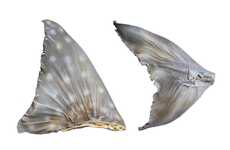
In This Series We See How Sharks are Hunted for Their Fins and Meat
Farida Helmy — August 3, 2014 — Social Good
References: thomaspeschak & featureshoot
Wanting to widen people's perspectives about these majestic underwater creatures, this shark photo series is trying to send a message that people and sharks can co-exist.
National Geographic photographer and marine biologist Thomas Peschak hopes to transform people's ideas of sharks as dark menacing creatures into animals worthy of respect and protection from the onslaught that happens to them on a daily basis -- 40 to 100 million sharks are killed every year for their fins and meat with already 465 species of sharks on the brink of extinction.
"There is a hunger for knowledge about these animals and how they relate to our lives," says Peschak about the shark photo series.
Having traveled to more than two-dozen locations and encountering more than 30 different species of sharks, Pechak was able to complete his project.
National Geographic photographer and marine biologist Thomas Peschak hopes to transform people's ideas of sharks as dark menacing creatures into animals worthy of respect and protection from the onslaught that happens to them on a daily basis -- 40 to 100 million sharks are killed every year for their fins and meat with already 465 species of sharks on the brink of extinction.
"There is a hunger for knowledge about these animals and how they relate to our lives," says Peschak about the shark photo series.
Having traveled to more than two-dozen locations and encountering more than 30 different species of sharks, Pechak was able to complete his project.
Trend Themes
1. Shark Conservation - Disruptive innovation opportunity: Develop innovative solutions and technologies to protect and conserve shark populations.
2. Eco-tourism - Disruptive innovation opportunity: Create sustainable and educational shark-focused tourism experiences to promote conservation and awareness.
3. Sustainable Fishing - Disruptive innovation opportunity: Implement sustainable fishing practices and technologies to reduce the demand for shark fins and meat.
Industry Implications
1. Marine Conservation - Disruptive innovation opportunity: Apply advanced data analytics and artificial intelligence to monitor and protect marine ecosystems, including sharks.
2. Tourism and Hospitality - Disruptive innovation opportunity: Develop immersive virtual reality experiences that provide a safe and educational way to encounter sharks and raise awareness.
3. Aquaculture - Disruptive innovation opportunity: Utilize aquaculture techniques to produce sustainably farmed seafood alternatives, reducing the need for shark products.
6.8
Score
Popularity
Activity
Freshness























